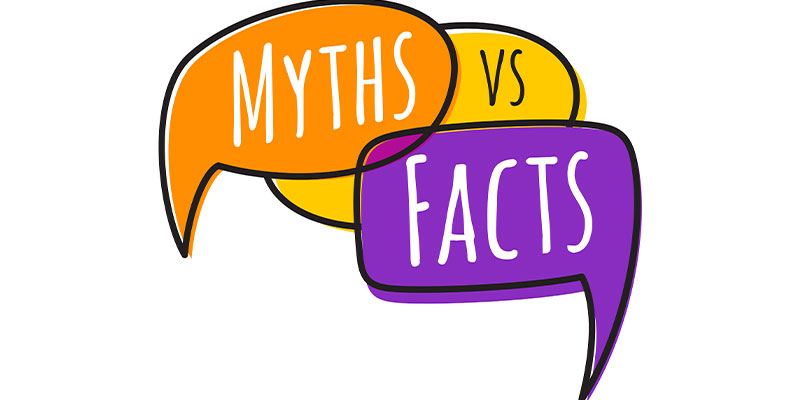In a globalized world, learning a new language helps us understand the complications of other societies, fosters empathy, and enables us to establish particular and professional connections with people from each around the world. One of the most interesting things you may encounter as you step into the global world is language myths. While working with language translation services or receiving such services, you will constantly come across language myths. You may have heard before that children are better language learners than grown-ups or that you need an important memory to learn a new language. These and analogous myths are frequently grounded on conceptions and are presented as if they were proven facts. However, language learning is such a complex subject that it cannot be explained by these hearsay myths. Learning a new language is already challenging, and these misconceptions we have about language learning can further complicate the process.
In this composition, we will reconsider the top 10 common or garden language myths and give you the verity that may be holding you ago from mastering a new language. By reading our composition, you’ll gain a better understanding of what’s true and what’s false and come more seasoned to achieve success in language literacy.

Most Common Language Myths
There are numerous language myths and misconceptions about language literacy, similar to the belief that it requires an important memory, that children are more successful at it, or that it’s purely a gift- grounded bid. While language myths may seem entertaining, they can have significant effects that discourage people from learning a new language. Thus, it’s important to know that utmost of the language myths are false. Here are some of the most common language myths:
1. Acquiring a second language necessitates a distinct set of abilities.
One of the most common language myths is really about the belief that you need to have a natural gift for languages. This widespread myth claims that learning a second language requires a distinct set of abilities, and some people are naturally good at it while others are not. The truth is that we’re all in the same position with introductory literacy capacities, and anyone can fluently learn a new language without taking any special gift.
Contrary to what language myths suggest, learning a new language does not require any specific innate abilities. Factors similar to provocation, time commitment, and proficiency in other languages come into play in language literacy. Whether you succeed or struggle in learning a new language solely depends on your approach and the amount of practice you put in.
In essence, what sets someone who speaks five different languages apart from another person is not their innate abilities. These individuals have simply discovered effective study methods for themselves, focused on learning a new language, manage the process, and dedicated a significant amount of time to it.
2. Learning a second language is limited to children.
Another common misconception is that learning an alternate language is much easier for children. Among all language myths, this myth probably arises from the observation that children generally have a more natural language proficiency compared to adults. Still, bilingualism can be achieved at any stage of life. It’s true that mastering a language becomes less natural as we progress, but that does not mean it’s impossible. Children do not learn a new language better than adults; they are simply in a more advantageous position due to their minds being like blank slates.
Another advantage that children have is that they do not have concerns about looking foolish. They aren’t hysterical about making miscalculations, saying the wrong effects, or mispronouncing words. Grown-ups, on the other phase, can be fairly tone-conscious in this appreciation. However, adults have a significant advantage in terms of analyzing language and grasping its intricacies.
In conclusion, children and grown-ups learn a new language in different ways, but with the right strategies, provocation, and interpersonal chops, grown-ups can also be veritably successful in language literacy.
3. A strong memory is a must for learning a foreign language.
It would be more correct to say that this belief is both true and false partially. Inside all language myths, this language myth is false because learning is one of the unhealthiest ways to learn a new language, and it’s true because memory is indeed necessary for storing new words, sounds, and meanings when learning a new language. Still, it’s important to flashback that the key isn’t having a good memory per se, but rather the capability to organize your memory effectively.
Speaking and harkening are indeed stylish ways to learn a language.
Instead of relying on rote memorization, focus on dedicating time to learning and utilize techniques such as spaced repetition and retrieval practice to organize your memory.
4. It is necessary to learn both speaking and writing concurrently.
It is one of the language myths that you need to learn how to write and speak a new language simultaneously; many languages are learned without any writing systems. When learning a new language, it’s more applicable to concentrate on developing speaking and understanding chops first and learn reading and jotting as you progress.
Learning sequentially rather than trying to do two things at once leads to faster progress. The decision on which aspect to prioritize also depends on the purpose of learning the language. If your goal is primarily conversation, you can postpone learning to read and write. Still, this doesn’t mean that literacy to write is gratuitous; it can be salutary in numerous aspects of language literacy.
In conclusion, you don’t need to be complete in writing to be fluent in speaking a language.
5. Understanding grammar is an essential aspect of language learning.
It’s one of the usual language myths and misconceptions that learning alphabet regulations is necessary when learning a new language. While grammar is an important element of language literacy, it isn’t a prerequisite. In fact, attempting to learn grammar in all its intricacies can be an ineffective approach to language learning. The reason why native speakers have a command of grammar in their first language is not because they have memorized rules, but because they have acquired grammar organically through imitation.
In conclusion, you don’t need to have a complete knowledge of alphabet rules to speak a language easily. In fact, overly focusing on grammar in the early stages of language learning can impede progress. It is better to learn grammar organically by mimicking and imitating native speakers.

6. You must need various resources, including books and apps.
One of the common language myths about language literacy is the belief that a variety of coffers similar to books and apps are necessary. Thinking that by dedicating just a few minutes each day to these resources, you will become fluent in a foreign language is unfortunately unrealistic.
While these coffers can help you in learning vocabulary and understand generalities, the ultimate thing of learning a language is being suitable to communicate with people, a commodity that indeed stylish books or apps cannot give. The only way to achieve fluent speaking skills is by engaging in abundant conversation practice with real people. Other methods should be seen as supplementary tools.
7. Learning a language always entails high expenses.
The misconception that you need to attend precious courses, study abroad, or hire a private instructor in order to learn a new language is a common misconception. Inside language myths, this misconception about language learning is not entirely accurate.
While it’s true that learning certain languages can be expensive, there are also numerous further accessible and affordable coffers available to learn other languages. Nowadays, with a device and internet access, you can learn the basics of any language.
Learning a language can be expensive depending on your preferences, but it doesn’t invariably have to be that expressway. It’s practicable to achieve it at much further accessible charges.
8. Immersion in a native-speaking environment is a requirement.
One of the major language myths is that you have to reside in a country where a language is stated in order to get that language. You do not need to go to Spain to learn Spanish or live in London for times to speak English like a native. Many people in Africa speak impeccable French without ever having been to France, while many individuals who move to foreign countries may not even learn the local language.
While it’s important and salutary to interact with native speakers when learning a language, you do not have to leave your home or live in the countries where the language is spoken for times to achieve that.
9. Languages follow certain rules and structures.
Languages indeed have rules, and people enjoy talking about them. However, the notion that languages have rigid rules can be misleading. When starting to learn a language, one learns many grammar rules, from plural endings to possessive markers, from inverted sentences to passive constructions. It’s frequently believed that these rules need to be learned, but while it’s helpful to know them, it isn’t an absolute demand.
These rules are typically found in textbooks, and we memorize and apply them during exams. However, there are also intuitive rules, which are intuitions about language patterns stored in our minds. For illustration, in your native language, you may know that a judgment is grammatically incorrect, but you may not be suitable to explain why. This is likely because you know it intuitively. Languages are full of these intuitive rules that are difficult to learn through memorization. In essence, languages do not have rules but rather rely on context.
10. Translation tools are great, and learning is unnecessary.
Thinking that translation tools are sufficient for communication can be misleading. While translation tools have made significant advancements in recent years, they may still be inadequate for professional communication. Translation tools can enhance productivity and serve everyday tasks or assist in researching a new word. However, these tools can never replace genuine human communication. Language carries complex, nuanced, and culturally embedded meanings that translation tools cannot fully capture. Aspects such as etiquette, thoughts, and debates are essential elements of language that cannot be accurately expressed by translation tools.
Additionally, learning a new language offers many other benefits that translation tools cannot provide. It can be beneficial for your career, create new job opportunities, and even contribute to better overall health. These are advantages that cannot be obtained solely by relying on a translation tool.



